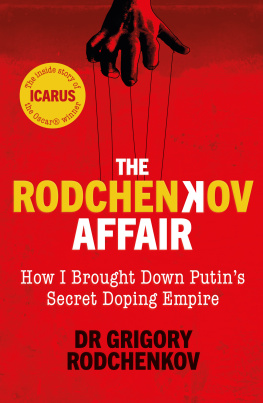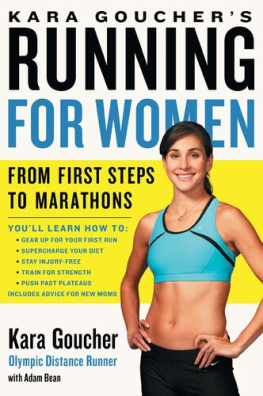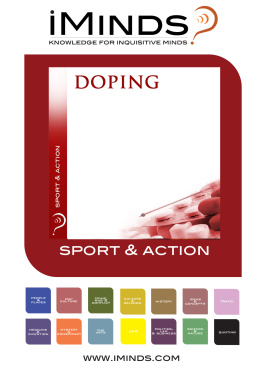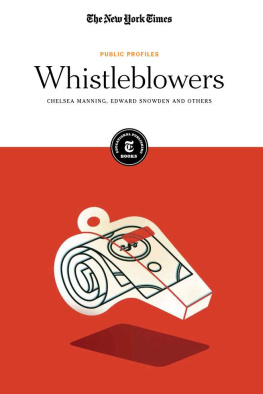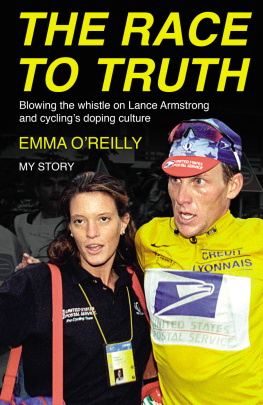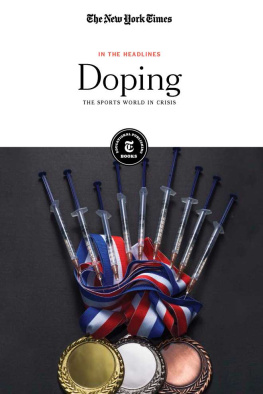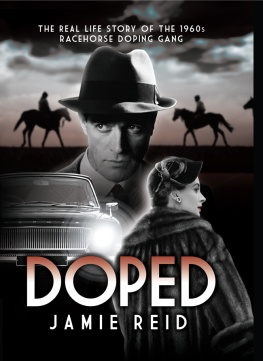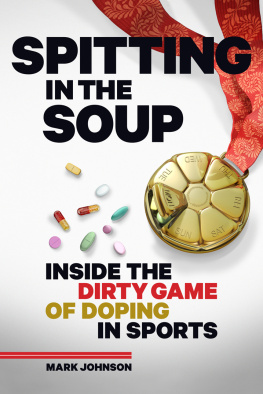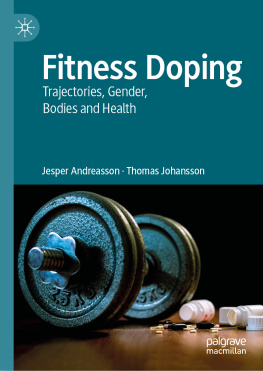
This ebook is copyright material and must not be copied, reproduced, transferred, distributed, leased, licensed or publicly performed or used in any way except as specifically permitted in writing by the publishers, as allowed under the terms and conditions under which it was purchased or as strictly permitted by applicable copyright law. Any unauthorized distribution or use of this text may be a direct infringement of the authors and publishers rights and those responsible may be liable in law accordingly.
WH Allen, an imprint of Ebury Publishing,
20 Vauxhall Bridge Road,
London SW1V 2SA
WH Allen is part of the Penguin Random House group of companies whose addresses can be found at global.penguinrandomhouse.com.

Copyright Dr Grigory Rodchenkov, 2020
Cover Design Two Associates
Nineteen Eighty-Four by George Orwell (Copyright George Orwell, 1949) reproduced by permission of Bill Hamilton as the Literary Executor of the estate of the late Sonia Brownell Orwell.
All photos authors own, except Getty Images
Dr Grigory Rodchenkov has asserted his right to be identified as the author of this Work in accordance with the Copyright, Designs and Patents Act 1988
First published in the United Kingdom by WH Allen in 2020
penguin.co.uk
A CIP catalogue record for this book is available from the British Library
ISBN: 9780753553343
Note to the Reader
By my definition, a whistle-blower is a man who dwells in an ambiguous netherworld, where a perverse pride in his past unethical achievements coexists with a desire to expose the corrupt system that successfully nurtured him for so long.
What follows is not an attempt to make excuses for my actions, nor to justify them. It strives to be one thing above all: honest. I will not shy away from giving a full and candid account of what I did, and nor do I ask you to forgive me. For as George Orwell wrote, There was truth and there was untruth, and if you clung to the truth even against the whole world, you were not mad.
Lets begin.
Introduction
I am in involuntary exile from my homeland, Russia. I live in protective custody in the proverbial undisclosed location, and whenever I leave my small apartment I am accompanied by one, or sometimes two, armed guards. On occasion, I wear a bulletproof vest.
For much of my youth, I was a competitive runner; now when I want to jog or even go for a walk, I have to wait for someone to take me out, just as my dog used to when I lived in Moscow.
I fled Russia in November 2015, fearing for my life.
As an academic chemist trained in instrumental analysis, analytical chemistry and chemical kinetics, I helped run the most successful sport doping enterprise in world history. As director of Russias ironically named Moscow Anti-Doping Centre, my job was to make sure that the hundreds of Russian athletes participating in international events were never caught with banned substances, such as anabolic steroids or synthetic testosterone, in their body fluids during training camps and competitions.
When we were at the height of our powers, there seemed to be nothing we could not do. Dirty urine samples soaked with performance-enhancing drugs emerged clean from my laboratory. For over ten years, and five Olympics, not one athlete under my guidance tested positive for doping substances during the competitions.
George Orwell wrote about doublethink, which he said was To know and not to know, to be conscious of complete truthfulness while telling carefully constructed lies. I embody this Orwellian doublethink: I was dedicated to Soviet and Russian sport, yet I am denounced as a traitor in my own country. I am one of the reasons my country won so many Olympic medals from 20042014, yet I was also the cause of their banishment from the Olympic Movement.
I consider myself to be honest, yet I knowingly defrauded the worlds anti-doping authorities for more than a decade, both for the greater glory of Russian athletes and also to satisfy sports bureaucrats who were bent on perpetuating Russias sporting success. I justified my actions to myself by explaining that there had never been any real doping control in the Soviet Union or in Russia, so I was simply continuing along a well-trodden path. At the same time, I had contempt for the international anti-doping authorities, who spouted high-minded rhetoric about clean sport but Orwell again failed repeatedly to see what was in front of their nose. To my mind, they were never serious about cracking down on sport doping. Fans paid lots of money to watch elite athletes, both live and on TV, and sport didnt look broken. Why should they, or I, bother to fix it?
I am a devoted husband and father, but I havent seen my wife and children in four years.
My name appears in international newspapers, but I am a ghost.
You have heard about the fox and the henhouse. Well, I was the fox. I built the henhouse. And then I ate the hens.
But I certainly didnt work alone in fact, I administered Russias doping operation under the close scrutiny of the secret police: the FSB, the former KGB. The Ministry of Sport monitored my every move. And all this took place under the watchful eye of the sport-obsessed judo fan himself, President Vladimir Putin.
Seven months prior to the 2014 Winter Olympic Games in Sochi, reports emerged of systematic cheating by Russian athletes. The details were initially murky, and the early whistle-blowers were former dopers who had dropped out of Russian sport. It would be two years before the full scope of Russias state-sponsored, systematic doping programme came to light a programme that had been part of the fabric of Soviet and Russian sport for decades.
Following the revelations after the Sochi Games, it became very inconvenient to be me. The World Anti-Doping Agency (WADA) and the International Olympic Committee (IOC) initiated full-blown investigations of the Russian sport hierarchy. My name appeared 97 times in a 2015 Independent Commissions Report, more than anyone elses according to them, I was the heart of the positive drug test cover-up. I was also famously identified as an aider and abettor of the doping activities.
The massive doping scandal that would result in Russias limited participation in the Rio de Janeiro Olympic Games in 2016, and their painful suspension from the Paralympic Games in 2016 and the Winter Games in Pyeongchang in 2018, exploded into the worlds headlines. This wasnt just a sporting controversy; it was a geopolitical event. An irate President Putin demanded personalised and absolute accountability from the perpetrators of the doping scheme. My face was in the centre of the bulls eye I had been director of the Moscow Anti-Doping Centre since 2005, and I was in charge of the famously corrupt Olympic laboratory at the Sochi Winter Games in 2014.
After I was forced to resign from the Anti-Doping Centre, friends warned me that my life might be in danger. Facing possible expulsion from the Olympic Movement, the Putin regime was eager to identify scapegoats and pretend it was fighting against doping. When the Los Angeles-based filmmaker Bryan Fogel, with whom I had been collaborating on the movie that would become the Academy-Award-winning documentary Icarus, offered me a ticket to the United States, I grabbed my laptop and hard drive from my office, packed a carry-on bag and fled.
It was a radical decision. I abandoned Veronika, my wife of 34 years, and my two adult children, Vasily and Marina. The
Next page
